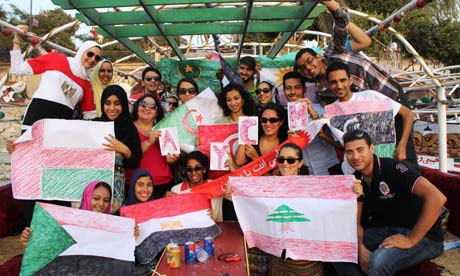The Arab Youth Climate Movement should give us hope
If the winds of change sweeping the Arab region collided with the slow-moving front of climate negotiations, anything is possible

Established in the lead up to the COP18 Doha negotiations, the Arab Youth Climate Movement brings together over 20 campaigners from 15 Middle East/North Africa countries. Photograph: AYCM
Young people in the Middle East and North Africa have inspired many of us during the past two years, and they will do so again on Saturday. They are taking to the streets in more than a dozen countries, only this time it won't be to topple a dictator – it will be to demand action onclimate change.
This weekend we will see the birth of the Arab Youth Climate Movement. Considering the enormous challenges they face on a day-to-day basis, its very existence sends a powerful message to leaders not only in the region, but worldwide: tackling climate change is a priority.
With Qatar about to become the first Middle East country to host a major UN climate conference, the issue of climate change will be on the region's political agenda unlike any time before, and Arab youth are making their voices heard. In more than a dozen countries across the region they have organized a variety of public events; ranging from street art fairs in Beirut to marches in Gaza, a rally in Cairo and a conference in Tripoli.
These young activists are calling on their governments to pledge emission cuts, and are pressing the government of Qatar, as the host country, to secure a strong outcome from the international talks. Doing so would begin to change the region's current reputation for obstruction when it comes to dealing with climate change.
The new movement was initiated with support from the Arab organisationIndyACT, 350.org, and the global TckTckTck campaign which organised a regional workshop in Egypt this year. Five hundred people applied to take part, and 20 inspiring Arab youth leaders were selected as national coordinators to begin the difficult task of getting organised.
Simply attending that first workshop served as a reminder of the many challenges facing activists in the region. A Tunisian applicant was hospitalised after getting caught up in clashes in her city, a Palestinian applicant could not get his visa due to strict security measures, and a Syrian applicant was unable to attend because of fighting in his home city.
When the Doha talks begin on 26 November, governments will be under pressure to dramatically scale up their ambition both in terms of emissions reductions as well as delivering on their promised financial support to developing countries.
It's worth remembering that the pledges currently on the table only add up to about half of what we need to stave off catastrophic climate change. Don't get me wrong – there are hopeful signs that the negotiations are beginning to yield positive results. But progress in the talks is being outpaced by the increasingly dramatic impacts from our changing climate. This year alone saw record breaking droughts, crop shortages, extreme flooding, heatwaves, and the second "once-in-a-lifetime" storm to hit New York City and the surrounding region in the past 14 months.
It is easy to despair, but the activism of young people – and these young people in particular – gives me hope. Just think what could happen if the winds of change sweeping the Arab region were to collide with the slow-moving front which is the international climate negotiations.
And what if President Obama, now freed from having to campaign for re-election were to make addressing climate change a legacy issue for his second term? Could a new president of China mean a different approach from that country?
Maybe I'm an eternal optimist, but I'm beginning to think anything is possible.
No hay comentarios:
Publicar un comentario